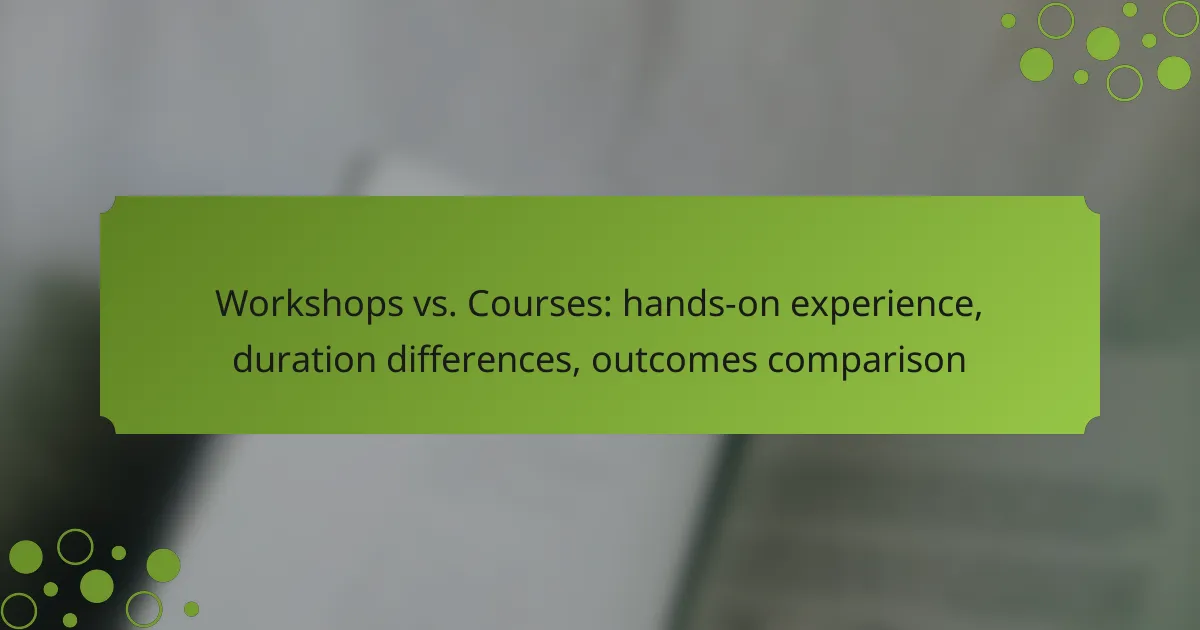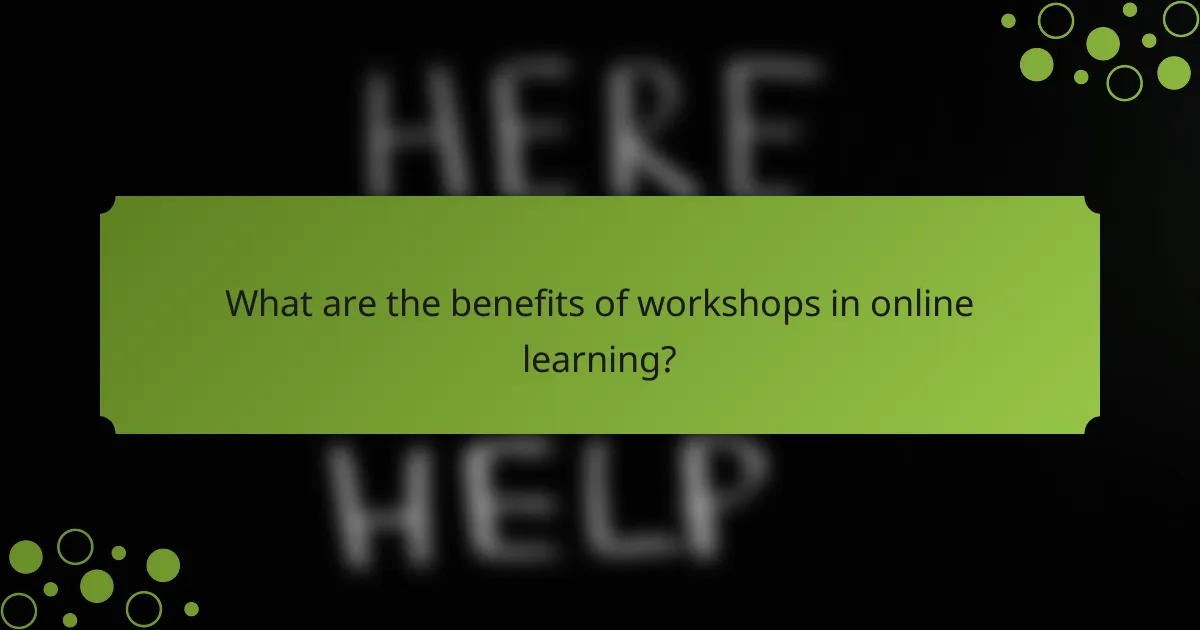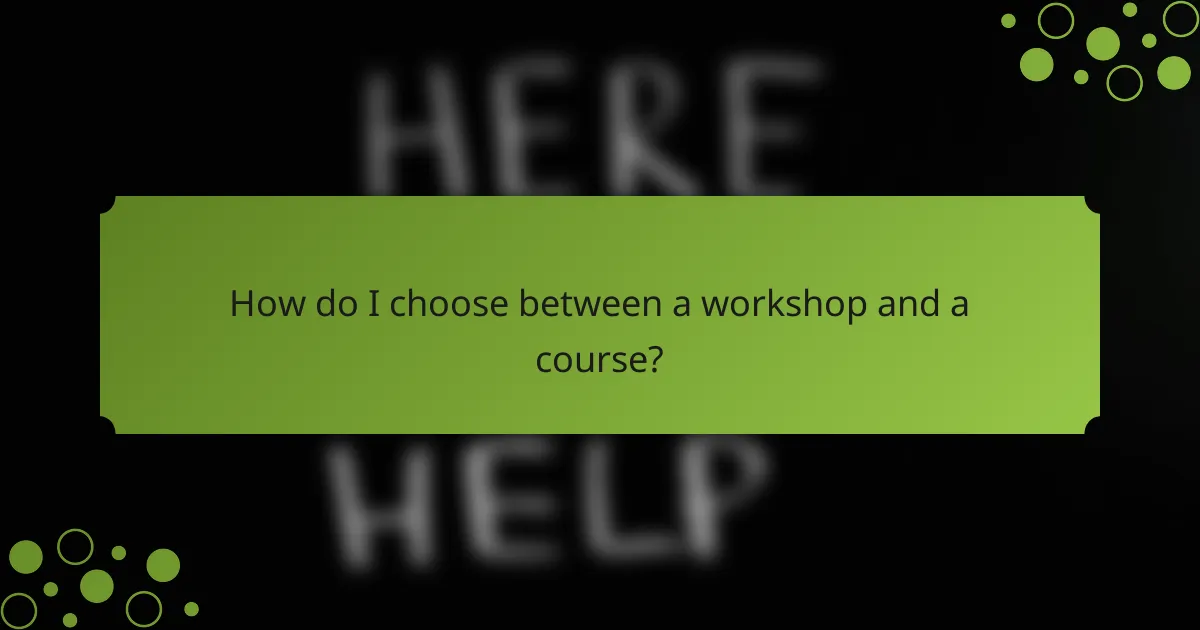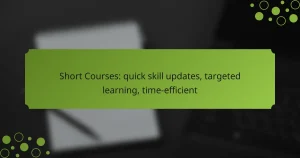
Understanding the differences between workshops and courses is essential for choosing the right learning path. Workshops focus on hands-on experience and practical skills, encouraging active participation, while courses offer a more structured and theoretical approach, allowing for flexible learning at one’s own pace. Each format has distinct outcomes, catering to different learning preferences and goals.

What are the key differences between workshops and courses?
Workshops and courses differ primarily in their structure and focus. Workshops emphasize hands-on experience and practical skills, while courses typically provide a more structured, theoretical approach to learning.
Hands-on experience in workshops
Workshops are designed to provide participants with practical, hands-on experience. They often involve interactive activities, allowing learners to apply concepts in real-time. For example, a cooking workshop may have attendees preparing dishes under the guidance of an instructor.
This experiential learning approach helps reinforce skills and knowledge, making it easier for participants to retain information. Workshops are ideal for those looking to gain immediate, applicable skills in a short time frame.
Structured learning in courses
Courses offer a more comprehensive and structured approach to education, often spanning several weeks or months. They typically cover a broader range of topics and include lectures, readings, and assessments. For instance, a digital marketing course might include modules on SEO, content strategy, and analytics.
This structured format allows for in-depth exploration of subjects, catering to learners who prefer a systematic method of acquiring knowledge. Courses often culminate in certifications or diplomas, adding value to participants’ professional credentials.
Duration of workshops vs. courses
Workshops are usually short, lasting anywhere from a few hours to a couple of days. This brevity allows for focused learning on specific skills or topics. In contrast, courses can last several weeks to months, requiring a greater time commitment from participants.
When choosing between the two, consider your availability and learning goals. If you need quick skill acquisition, a workshop may be more suitable, while a course is better for comprehensive understanding.
Outcomes of workshops compared to courses
The outcomes of workshops and courses can vary significantly. Workshops typically result in immediate skill application, making them ideal for practical tasks. Participants often leave with tangible skills they can use right away.
Courses, on the other hand, tend to provide a deeper understanding of a subject, leading to long-term knowledge retention and the potential for career advancement. Consider your objectives when deciding which format aligns best with your learning needs.

What are the benefits of workshops in online learning?
Workshops in online learning offer a dynamic way to gain practical skills through hands-on experience. They typically emphasize active participation and collaboration, making them ideal for learners seeking immediate application of concepts.
Interactive learning environment
Workshops create an interactive learning environment that fosters engagement and collaboration among participants. Unlike traditional courses, which may rely heavily on lectures, workshops encourage discussions, group activities, and real-time problem-solving.
This interactive format allows learners to share ideas and experiences, enhancing understanding through peer-to-peer learning. For example, a workshop on digital marketing might include group projects where participants develop campaigns together, providing a richer learning experience.
Immediate feedback from instructors
One of the key advantages of workshops is the opportunity for immediate feedback from instructors. This real-time interaction allows learners to ask questions and receive guidance as they work through practical exercises.
For instance, during a coding workshop, participants can demonstrate their code and receive instant critiques, enabling them to correct mistakes on the spot. This immediate feedback loop can significantly accelerate the learning process compared to traditional courses where feedback may take days or weeks.

What are the advantages of online courses?
Online courses offer flexibility, accessibility, and a broad range of topics, making them an attractive option for many learners. They allow individuals to learn at their own pace and on their own schedule, which can enhance the learning experience.
Flexible scheduling options
One of the primary advantages of online courses is their flexible scheduling. Learners can choose when to engage with course materials, allowing them to balance education with work and personal commitments. This flexibility can be particularly beneficial for those with irregular schedules or family responsibilities.
Many online courses are self-paced, enabling students to progress through the content as quickly or slowly as they prefer. This can lead to a more personalized learning experience, as individuals can spend extra time on challenging topics or move quickly through familiar material.
Access to a wider range of topics
Online courses provide access to a diverse array of subjects that may not be available locally. From niche topics like data science to broader subjects like business management, learners can explore interests that align with their career goals or personal passions.
This wide selection is particularly valuable for individuals in remote areas or those with limited access to traditional educational institutions. Online platforms often host courses from various universities and industry experts, ensuring that learners can find high-quality content across different fields.

How do I choose between a workshop and a course?
Choosing between a workshop and a course depends on your learning objectives and available time. Workshops typically focus on hands-on experience in a shorter timeframe, while courses often provide in-depth knowledge over a longer duration.
Assessing personal learning goals
Start by identifying what you want to achieve. If your goal is to gain practical skills quickly, a workshop may be more suitable. For a comprehensive understanding of a subject, a course might be the better option.
Consider the depth of knowledge you need. Workshops often cover specific topics or skills, while courses can explore broader concepts and theories. For example, if you want to learn a new software tool, a workshop can provide immediate, applicable skills.
Evaluating time commitment
Assess how much time you can dedicate to learning. Workshops usually last a few hours to a couple of days, making them ideal for those with limited availability. In contrast, courses may span several weeks or months, requiring a more significant time investment.
Think about your schedule and flexibility. If you can commit to regular sessions, a course can offer structured learning. However, if you prefer a more intensive, short-term experience, a workshop is likely a better fit.

What are popular platforms for workshops and courses?
Popular platforms for workshops and courses include Coursera and Skillshare, each catering to different learning styles and needs. Coursera focuses on structured courses often associated with universities, while Skillshare emphasizes hands-on workshops that encourage creativity and practical skills.
Coursera for courses
Coursera offers a wide range of online courses from universities and organizations worldwide, covering various subjects. These courses typically last from a few weeks to several months and often include video lectures, quizzes, and peer-reviewed assignments.
When choosing a course on Coursera, consider factors like the course length, level of difficulty, and whether it offers a certificate upon completion. Many courses are available for free, but a fee may apply for certification.
Skillshare for workshops
Skillshare specializes in creative workshops that focus on practical skills, such as design, photography, and writing. Workshops usually range from a few minutes to a couple of hours, allowing for quick learning and immediate application of skills.
When selecting a workshop on Skillshare, look for user ratings and project-based outcomes to ensure quality. Membership is subscription-based, providing access to all workshops, which can be a cost-effective option for frequent learners.

How do workshops and courses impact career outcomes?
Workshops and courses both significantly influence career outcomes, but they do so in different ways. Workshops often provide hands-on experience and practical skills, while courses typically offer in-depth knowledge and formal certification.
Skill acquisition through workshops
Workshops focus on practical skill acquisition, allowing participants to engage in hands-on activities that enhance their learning. This experiential approach is particularly beneficial for those looking to quickly apply new skills in real-world scenarios, such as coding bootcamps or creative writing workshops.
Typically lasting from a few hours to several days, workshops can be a time-efficient way to gain specific skills. For example, a weekend workshop on digital marketing might equip attendees with actionable strategies they can implement immediately in their jobs.
Certification benefits from courses
Courses usually culminate in a formal certification, which can enhance a resume and signal expertise to potential employers. Certifications from accredited institutions often carry weight in the job market, particularly in fields like IT, healthcare, and finance.
Courses tend to span several weeks to months, providing comprehensive coverage of a subject. For instance, a three-month online course in project management may delve into methodologies, tools, and best practices, offering a deeper understanding than a short workshop.

What trends are shaping the future of workshops and courses?
The future of workshops and courses is increasingly influenced by the rise of hybrid learning models and the integration of emerging technologies. These trends are reshaping how educational experiences are delivered and consumed, making them more accessible and engaging for learners.
Increased demand for hybrid learning
Hybrid learning combines in-person and online instruction, catering to diverse learning preferences. This approach allows participants to benefit from hands-on experiences while also accessing digital resources, making education more flexible and inclusive.
For instance, a workshop might involve live demonstrations alongside virtual tutorials, enabling learners to practice skills in real-time while having the option to revisit recorded sessions later. This model is particularly appealing in professional development, where busy schedules often limit full-time attendance.
Emerging technologies in education
Technological advancements are transforming how workshops and courses are structured and delivered. Tools such as virtual reality (VR), augmented reality (AR), and interactive platforms enhance engagement and provide immersive learning experiences.
For example, a course on architecture might use VR to allow students to explore building designs in a simulated environment, while AR can overlay digital information onto physical spaces during workshops. These technologies not only enrich learning but also prepare participants for modern workplace demands.


